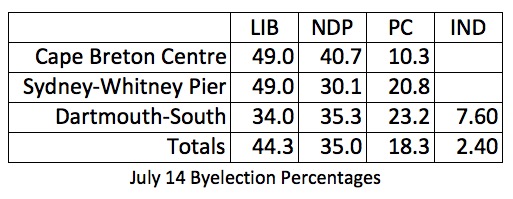15 Jul The NDP is not dead; Jamie Baillie may be

On the surface, it looks like a great evening for Stephen McNeil’s governing Liberals: Decisive wins in two Cape Breton seats previously held by the NDP against a squeaker loss in Dartmouth South, a seat they won last time. Liberals took 44.3 percent of the combined vote in the three ridings, down just slightly from the 45.7 percent that swept them to power two years ago.
In fact, it’s the NDP who should be celebrating.
The party has been leaderless for two years, its caucus reduced to a five-seat rump, its base smarting from the ineptitude of its rookie turn at the helm. That the party was able to take 35 percent of yesterday’s combined vote puts paid to the triumphalist obituaries so many were writing after its 2013 humiliation.
The NDP’s Cape Breton losses were entirely predictable; the wonder is they hadn’t slipped away earlier. Cape Breton exercised its well-known preference for representation on the government side of the house.
In the bygone days of steel and coal, Cape Breton was the NDP’s base. But it only ever won four Cape Breton seats—and that happened once, 37 years ago.
Redistricting created the Sydney-Whitney Pier seat as a mashup of Liberal downtown Sydney, NDP Whitney Pier, and battleground Ashby. In 2013, by dint of indefatigable constituent service and his courageous battle against cancer, Gordy Gosse unexpectedly held the seat against Derek Mombourquette, a credible, young municipal councillor. With Gosse out, it was Mombourquette’s turn.
Cape Breton Centre is traditionally the strongest NDP seat in the province, but it’s a long-ago tradition. Bone-lazy Frank Corbett, a miserable failure as Cape Breton’s political minister during the Dexter Disappointment, barely held it last time; no one was surprised to see fall to the Liberals this time.
These results should be seen as quirks of geography, history, and personality, with limited application to future elections in other parts of the province.
The NDP win in Dartmouth, on the other hand, shows the party remains competitive in the part of the province that packs the greatest electoral punch. A dismal turnout enhanced the voting power of citizens irked by the Film Credit debacle and McNeil’s shameful cuts to organizations that serve the poorest, most disadvantaged among us.
Jamie Baillie is the only current provincial party leader I count as a personal friend, but he has not clicked with the electorate. Making matters worse, he tacked hard right in a province with strong allegiance to the centre. Perhaps it was a misguided attempt to shore up the party’s base. The results have been disastrous.
None of the ridings that went to the polls yesterday were fertile ground for the Tories, but a combined 18.3% is a dismal outcome for the Leader of Her Majesty’s Opposition. Jamie needs to consider his future, and his party’s.
